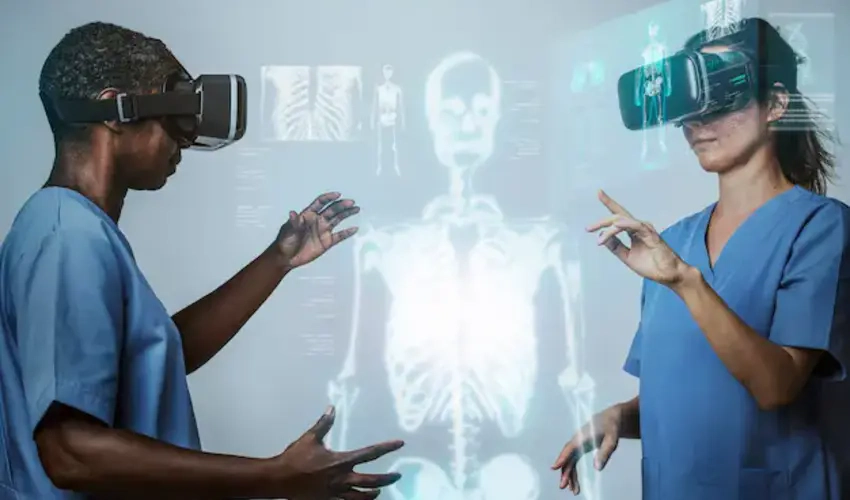The future of technology has continued to be extremely attractive and one specific area that has encountered expansion and development in the past few years is the department of AI-based virtual medical assistants. These assistants have become extremely dominant and are utilized in different apps, particularly in the healthcare sector. Nevertheless, they also come with specific hurdles that have to be resolved. In this article, we will assess the features relevant to AI-driven virtual assistants in healthcare.
Introduction
The healthcare department has witnessed an important rise in the utilization of artificial intelligence specifically via virtual medical assistants. This rise has been very important. Healthcare settings are developing and utilizing VMAs more frequently.
Artificial intelligence tools are converting healthcare companies by helping providers in delivering good patient care. This simplifies administrative tasks and enhances patient health. Today, we have witnessed the ways through which virtual medical assistants are transforming the patient experience. They do this by modifying interactions, monitoring patients, and enhancing treatment compliance.
Keeping this scenario under consideration, we are presenting to you some important features of AI-driven virtual medical assistants in healthcare.
Data Analysis and Health Tracking
Chatbots can fit in with wellness tracking tools and other wearable devices to track sleep patterns, physical activities, and patients’ important signs. By evaluating this information, they can provide insights into health trends and offer suggestions to maintain a healthy lifestyle.
Medication Reminders
Virtual assistants can help patients manage their medications by offering reminders for refills and dosage schedules. This feature can enhance medication adherence while reducing the risk of medication errors and missed doses.
Modified Care
Chatbots can rely on artificial intelligence and machine learning algorithms to assess patient data and their medical records. It allows comprehend the problem symptoms to propose the pertinent medical practitioner who would be the right person to resolve the patient’s problems. Bots can adapt to a person’s requirements, medical histories, and preferences. They provide customized healthcare guidance.
24/7 Availability
Healthcare chatbots can provide 24/7 availability to the patients. This permits the patients to access assistance and knowledge anytime. This can be particularly helpful for handling non-emergency medical inquiries, setting up appointments, and providing fundamental health advice.
The future of medical care chatbots is overflowing with promises, driven by developments in the latest technology. Virtual assistants will be important in offering efficient and modified healthcare support. With natural language processing enhancements in machine learning, virtual assistants will become even more capable and advanced in responding and comprehending to human commands.
Looking ahead, the role of AI in healthcare appears composed for more growth. Innovation in AI technology continues to develop. By doing so, virtual medical assistants will become even more integrated into the customer’s healthcare systems.
Virtual medical assistants can, therefore, be called upon to assist in the prevention of diseases, management of chronic illnesses, and improving the productivity of healthcare staff. Given the emerging fashions, these AI systems could be facilitating more personalized, accessible, and efficient care for patients. There are still concerns about the future of artificial intelligence and its associated challenges: ethical and data privacy concerns are at the top of the list.
Possible solutions arise from such challenging situations. And the future of healthcare is digital, albeit dim; it is a future based on data and centered on patients.
In summary, virtual health assistants and another opportunity for healthcare interaction to take place. To some extent, they enhance advanced support for improved patient engagement and compliance. They can also monitor health status on an ongoing basis and even provide mental health support.
Frequently Asked Questions (FAQs)
What is an AI-Driven Virtual Medical Assistant?
The healthcare department has witnessed an important rise in the utilization of artificial intelligence specifically via virtual medical assistants. This rise has been very important. Healthcare settings are developing and utilizing VMAs more frequently.
What is the main feature of AI-driven virtual medical assistants?
Chatbots can rely on artificial intelligence and machine learning algorithms to assess patient data and their medical records. It allows comprehend the problem symptoms to propose the pertinent medical practitioner who would be the right person to resolve the patient’s problems. Bots can adapt to a person’s requirements, medical histories, and preferences. They provide customized healthcare guidance.

